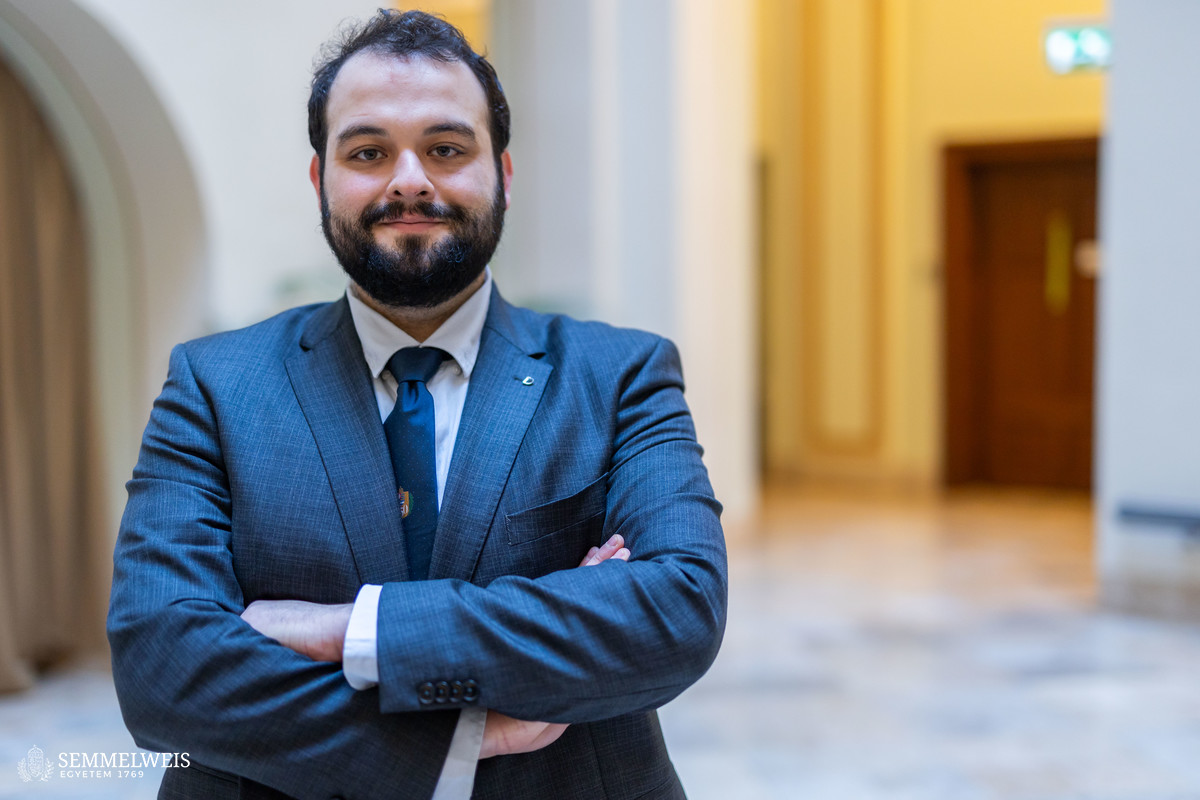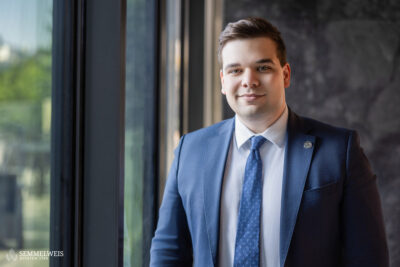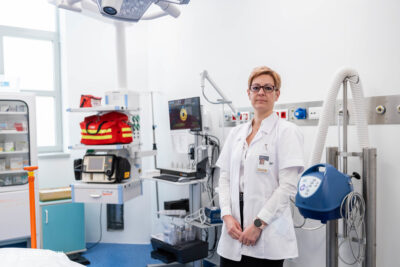The first time Dr. Caner Turan got involved with student representation was in his third year at the Faculty of Medicine in 2015, when the Students’ Union (HÖK) asked the active contribution of international students at ISAS (predecessor of today’s ISSA) in amending the then outdated HÖK constitution. As a passionate advocate for representational democracy, he did not hesitate to join the ranks of the Students’ Union. At that time, he also acted as male co-president of the Turkish Students’ Association of Semmelweis, trying to facilitate managing affairs of compatriot students and maximizing the opportunities the university had to offer. Later, he was elected as student senator, empowering him to vote on behalf of thousands of international Semmelweis undergraduates.
The science of advocacy
Faced with the seemingly impossible challenge of representing the diverging needs of international students from diverse backgrounds, he took the approach of addressing the universal needs shared by every student. Dr. Caner Turan encountered the same situation as international coordinator at the Alumni Directorate and as a PhD student at the Center for Translational Medicine, which inspired him to run for a position at the Doctoral Students’ Union (DÖK) as well. In this capacity, he envisages setting up a community and network that can not only smoothly address and support the needs of its students, but also ensure a reciprocity between the university and its citizens.
He believes that the scientific approach of combining observation (surveying students) and data analysis makes it possible to reveal underlying reasons for questions of student satisfaction as well as to chart factors that motivate graduates to stay affiliated with their alma mater.
Besides student feedback, Dr. Caner Turan also drew inspiration from his own experiences as a Semmelweis student, knowing firsthand the “jarring challenges” of the first two years as compared to the collegial atmosphere of the clinical practice and the collaborative setup following graduation. This latter phase, he confesses, is the time of giving back via acting as “amateur ambassadors” of the university. Dr. Caner Turan himself is often contacted by prospective students and their families, who ask for his advice. But PhD students also indirectly spread the message of Semmelweis at scientific conferences. “Oddly enough, it is those who have already contributed to the common goal of the university, who have a place and an earned name here, who tend to remain affiliated, as they feel being a member of the community,” he adds.
A further component of this engagement is language proficiency, highlights Dr. Caner Turan, who advises every international student to acquire a level of Hungarian that enables them to maximize their studies, facilitating not only project collaborations with fellow local students, but also communicating with the clinical personnel, the patients and their relatives during clinical practice.
Besides language, “we encounter cultural differences, too, but if we pay attention, we realize where those, otherwise well-intentioned differences originate from,” he continues. “For instance, if you put two Turks in a room, you can be sure that in 15 minutes, there will be 20 of us there, because we are drawn to each other. This is a cultural thing.” Similarly, Dr. Caner Turan believes that university excellence can be maximized if expertise is manifested in “a city of few-storey buildings” of professionals, rather than isolated “towers” of prolific scientists, who, however admirable in their achievements may be, would not manage on their own to do all the work alone, which also includes embracing those who face challenges during their studies, so volunteering students need to reach out to them. “What we need is a city,” he concludes. Therefore, as a member of DÖK he finds it crucial to map the decentralized student communities and reach out to them directly.
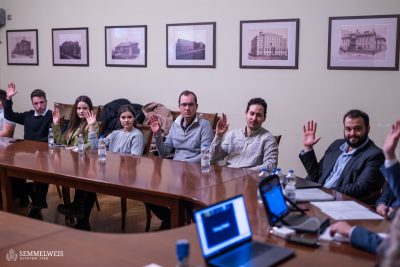
In Dr. Caner Turan’s opinion, the best-case scenario is that either the students themselves are motivated and look for extra-curricular opportunities, like him, visiting the operating theater of the Department of Orthopedics on a weekly basis in his undergraduate years, or they are surrounded by a safety net of fellow students. As someone engaged with student representation, he is rather concerned about those students who feel isolated. This is why it is fortunate if undergraduate students are offered one-on-one consultation by clinical and laboratory lessons teaching staff, as was his case with Dr. Gábor Skaliczki from the Department of Orthopedics. “Professors have no idea how much this offer is worth for international students. For those professors, it is half an hour of their time. For the students, it means that for the rest of their lives, they are part of the Semmelweis Family, and they are much more likely to stay here.”
He welcomes the improvements made so far, especially with the launch of the Directory of Student Services, yet, he feels an unwavering dedication to creating pathways to every student. “It was luck for me, but I want this opportunity for every student.”
I fully believe in the vision of the university; I see absolutely no obstacle in front of Semmelweis becoming a top 100 university. But we need to agree all together that this is what we are working for. Without student cooperation, it’s impossible. So let’s get the international students on board with this mission.
A doctor-philosopher
Dr. Caner Turan’s career choice rooted in his passion for philosophy. “There are about eight billion people living on this planet. We all have two eyes, two ears, and one mouth. We should be able to make it work. However, apparently it is not really working right now,” he recalls his motives for transcending cultural and sociological barriers to reach a level where something impactful to humankind may be achieved. Throughout his search, he realized that whatever the answer may be, it must go through medicine as a science of the human health. “At the end of my life, I want to be able to look back and say, I did what I could for all mankind,” he defines the mission he believes all medical researches and practitioners should share. His recent research topics revolve around liver surgery patients, liver diseases and critical illness, tailored therapeutic approach of acute or chronic liver failure as well as blood glucose maintenance in intensive care.
He found his personal path at the Center for Translational Medicine (CTM), where he was attracted to the approach of combining scientific research with clinical practice.
If you only do clinical work, you are missing half of all medicine. Yet, if you do all the research, you are missing the point, that is, the patients, you lose the conviction why you should wake up every morning, sitting in front of a computer and do biostatistics.
A decisive moment was his encounter with Dr. Zsolt Molnár, now director of the Intensive Therapy Clinic, which attracted him to the field of anesthesia, where he met a community of excellence, a safety net of expertise that ensures a risk-free room for continuous improvement.
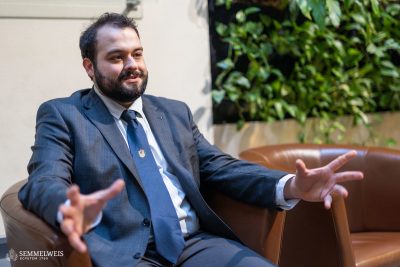 Dr. Caner Turan lives by the motto of “publish or perish”, manifested in an inner drive of continuous research. Therefore, he regards a PhD degree as a qualification that enables him to organize a research team if a new research questions arise. He considers it paramount to set up a system that facilitates finding scientific evidence to every medical dilemma any staff member of the department may be faced with. His dream is working exclusively with practitioners who conduct research simultaneously. To facilitate this, he also works as a methodology supervisor at the CTM at least 14 hours a week, guiding students to acquire skills necessary for a successful publication.
Dr. Caner Turan lives by the motto of “publish or perish”, manifested in an inner drive of continuous research. Therefore, he regards a PhD degree as a qualification that enables him to organize a research team if a new research questions arise. He considers it paramount to set up a system that facilitates finding scientific evidence to every medical dilemma any staff member of the department may be faced with. His dream is working exclusively with practitioners who conduct research simultaneously. To facilitate this, he also works as a methodology supervisor at the CTM at least 14 hours a week, guiding students to acquire skills necessary for a successful publication.
Occupied 12 hours a day, he finds it important to maintain a balance between passion for his work, a community of friends and loved ones from many disciplines and nationalities as well as a valve to release pressure. The latter in his case is practicing mindfulness and self-awareness, which he was introduced to at the elective course ‘Art of Learning’ by Dr. János Kollár, and which technique he found inevitable for preventing burnout and helping him focus.
There are so many moments of incredibly high pressure, at which, if you are thinking about the future, being afraid of messing up, then this is exactly what is going to happen. So, instead of that, you need to focus on the inner conversation with yourself, reassuring yourself of your scientific knowledge, at the same time maintaining your curiosity and excitement, which is balanced by the safety net of the surrounding group of experts.
And a city, i.e. a community of experts can guarantee that.
Judit Szabados-Dőtsch
Photo: Bálint Barta – Semmelweis University
